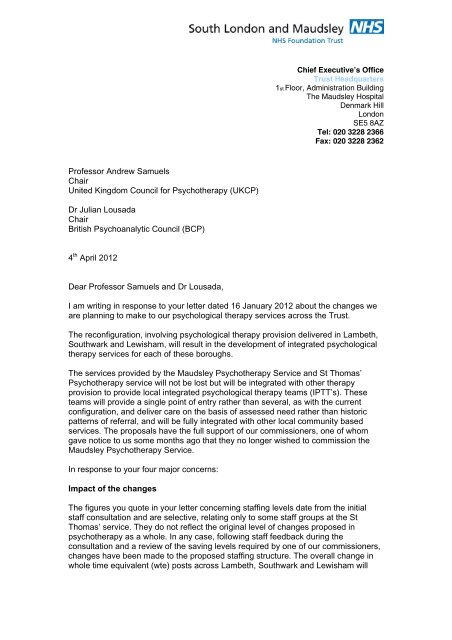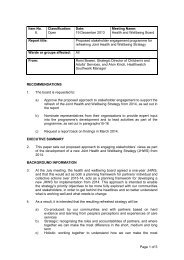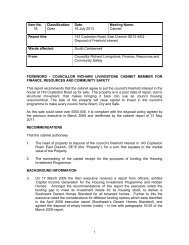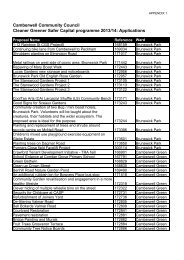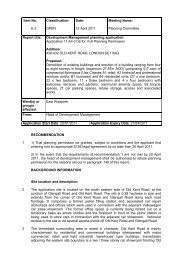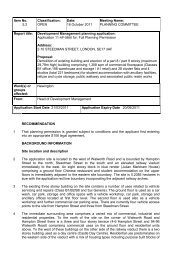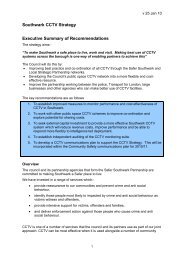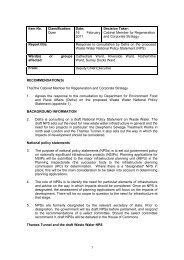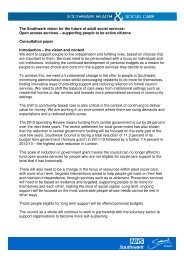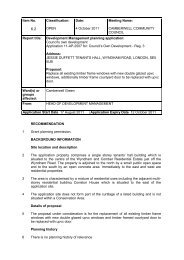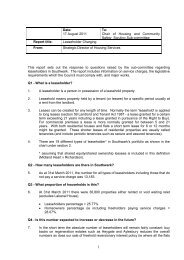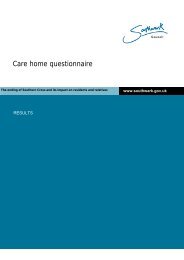Letter from Stuart Bell to UKCP, item 6. PDF 54 KB - Meetings ...
Letter from Stuart Bell to UKCP, item 6. PDF 54 KB - Meetings ...
Letter from Stuart Bell to UKCP, item 6. PDF 54 KB - Meetings ...
Create successful ePaper yourself
Turn your PDF publications into a flip-book with our unique Google optimized e-Paper software.
Chief Executive’s OfficeTrust Headquarters1st Floor, Administration BuildingThe Maudsley HospitalDenmark HillLondonSE5 8AZTel: 020 3228 2366Fax: 020 3228 2362Professor Andrew SamuelsChairUnited Kingdom Council for Psychotherapy (<strong>UKCP</strong>)Dr Julian LousadaChairBritish Psychoanalytic Council (BCP)4 th April 2012Dear Professor Samuels and Dr Lousada,I am writing in response <strong>to</strong> your letter dated 16 January 2012 about the changes weare planning <strong>to</strong> make <strong>to</strong> our psychological therapy services across the Trust.The reconfiguration, involving psychological therapy provision delivered in Lambeth,Southwark and Lewisham, will result in the development of integrated psychologicaltherapy services for each of these boroughs.The services provided by the Maudsley Psychotherapy Service and St Thomas’Psychotherapy service will not be lost but will be integrated with other therapyprovision <strong>to</strong> provide local integrated psychological therapy teams (IPTT’s). Theseteams will provide a single point of entry rather than several, as with the currentconfiguration, and deliver care on the basis of assessed need rather than his<strong>to</strong>ricpatterns of referral, and will be fully integrated with other local community basedservices. The proposals have the full support of our commissioners, one of whomgave notice <strong>to</strong> us some months ago that they no longer wished <strong>to</strong> commission theMaudsley Psychotherapy Service.In response <strong>to</strong> your four major concerns:Impact of the changesThe figures you quote in your letter concerning staffing levels date <strong>from</strong> the initialstaff consultation and are selective, relating only <strong>to</strong> some staff groups at the StThomas’ service. They do not reflect the original level of changes proposed inpsychotherapy as a whole. In any case, following staff feedback during theconsultation and a review of the saving levels required by one of our commissioners,changes have been made <strong>to</strong> the proposed staffing structure. The overall change inwhole time equivalent (wte) posts across Lambeth, Southwark and Lewisham will
change <strong>from</strong> 49 <strong>to</strong> 39 wte. In Lambeth, the service will reduce <strong>from</strong> 18 wte <strong>to</strong> 14 wteand for psychotherapy specifically, <strong>from</strong> 7.8 <strong>to</strong> 6 wte posts.Meeting the complex needs of the local population is a clear priority for us as well asfor our commissioners who, in particular, have asked us <strong>to</strong> review the delivery ofpsychological therapy <strong>to</strong> ensure that it works more closely with other local servicesand pathways. In Lambeth for example, this will be planned as part of the ongoingLiving Well Collaborative. We will moni<strong>to</strong>r the impact of this change very carefullyincluding consideration of temporarily flexing the workforce if necessary. However,we are aware, through a recent panelling process instigated by one of ourcommissioners, that some patients referred for psychotherapy may appropriately bediverted <strong>to</strong> other services or may be better served through new local communitymental health team models. This, alongside efficiencies realised though havingclearer referral pathways and single teams, will assist the service in mitigating theimpact of the changes.ConsultationStaff and service users have been involved <strong>from</strong> the outset in the development of thisproposal. One of the benefits of the Clinical Academic Group (CAG) model is theability <strong>to</strong> take an overview of all services delivering treatment <strong>to</strong> patients with similarneeds across a number of services. The Mood, Anxiety and Personality (MAP) CAGdeveloped this proposal through a systematic review of care pathways across theTrust. Staff and CAG service users were involved in this process throughout, startingwith a series of workshops in spring 2011 (28 February, 28 March and 23 May). Thiswork identified inconsistencies in the pathway, as well as concerns <strong>from</strong> serviceusers about uneven access and multiple assessments.The final proposal, developed by a steering group comprising senior psychologicaltherapy practitioners <strong>from</strong> all disciplines and professions, built upon this work. Anoutline of this model was presented at a workshop on 14 November 2011 attendedby 70 staff. The subsequent formal staff consultation, which ran <strong>from</strong> 9 December2011 <strong>to</strong> 16 January 2012, elicited 84 responses which were subsequently used <strong>to</strong>review the model. There have been a number of opportunities for ongoing staffinvolvement including the offer of individual interviews, as well as team discussionsconcerning the proposal.Involvement of service users in developing the proposal has been via the CAGservice user advisory group, which consists of patients with an expertise or personalexperience of services delivered for people experiencing mood, anxiety or personalityproblems. We did have concerns about the manner in which this proposal was beingdiscussed with patients currently in treatment and have now provided writteninformation for therapists; using their clinical discretion, <strong>to</strong> share with patients. Wehave recently engaged patients through the Lambeth, Southwark and LewishamLINks who are all committed <strong>to</strong> helping us <strong>to</strong> develop and moni<strong>to</strong>r the new model.Contribution of psychotherapy <strong>to</strong> the mental health communityThe proposal will not impact upon the opportunities for psychotherapy <strong>to</strong> make acontribution <strong>to</strong> the Kings Health Partners’ Clinical Academic Agenda. We arecommitted <strong>to</strong> maintaining all modalities where possible and maintaining andexpanding our training and supervision profile.
Balance of impact between psychology and psychotherapyThe configuration of professions within the new model was made with reference <strong>to</strong> areduction <strong>to</strong> psychology staffing as part of reconfigurations <strong>to</strong> Lambeth andSouthwark community services last year. We do not believe that the proposedservice configuration will affect the choice in the treatment of complex patients.We are working closely with our Local Authority overview and scrutiny committees inensuring that the impact of these changes on local people are well unders<strong>to</strong>od andhave effective mitigation. You will also be aware that NHS Foundation Trusts are notsubject <strong>to</strong> the same duty <strong>to</strong> consult with health overview and scrutiny committees inrespect of substantial developments or variations in service provision as other NHSbodies. As set out in the Health and Social Care (Community Health Standards) Act2003 (Supplementary and Consequential Provision)(NHS Foundation Trusts) Order2004 the duty upon NHS Foundation Trusts <strong>to</strong> consult health overview and scrutinycommittees does not arise over every proposal for a substantial development of theservice provided, but only wherea) the NHS Foundation Trust proposes <strong>to</strong> make an application <strong>to</strong> theIndependent Regula<strong>to</strong>r [“the regula<strong>to</strong>r”] of NHS Foundation Trusts <strong>to</strong> vary theterms of its authorisation; andb) that application if successful would result in a substantial variation of theprovision by the NHS Foundation Trust of protected goods or services in thearea of the local authority.We do not intend <strong>to</strong> make such application <strong>to</strong> the regula<strong>to</strong>r for any of our proposedchanges in our Forward Plan 2012-2015.Equality Impact assessments are available for Lambeth, Southwark and Lewisham.These do not indicate any adverse impact. Indeed, we expect <strong>to</strong> be able <strong>to</strong> improveaccess <strong>to</strong> people <strong>from</strong> BME communities through these changes.I hope this addresses the concerns raised in your letter. I would like <strong>to</strong> reassure youthat we remain committed <strong>to</strong> the provision of high quality psychological therapy. Weare holding an involvement event on 16 May 2012 which you are very welcome <strong>to</strong>attend, alternatively Steve Davidson, Service Direc<strong>to</strong>r, or Dr Jonathan Bindman,Clinical Direc<strong>to</strong>r, would be happy <strong>to</strong> discuss any further questions you may haveYours sincerely<strong>Stuart</strong> <strong>Bell</strong> CBEChief Executive


